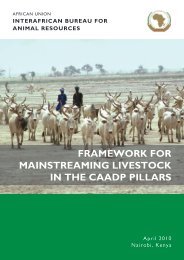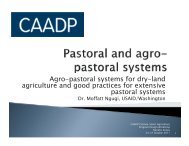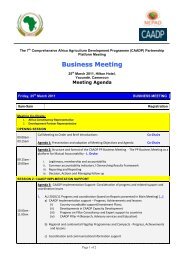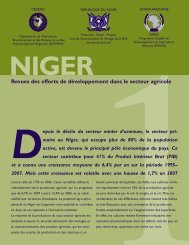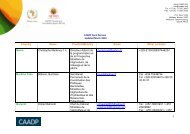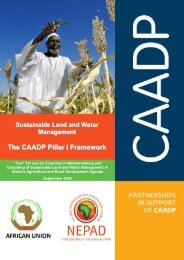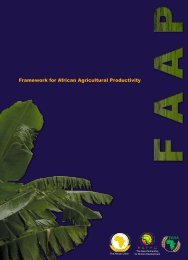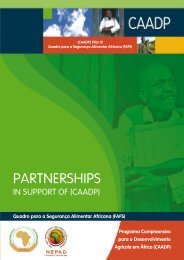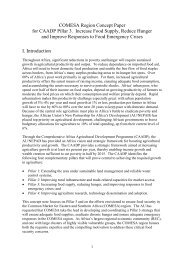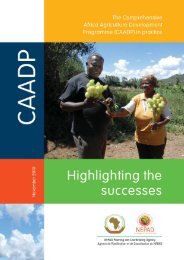The Role of Sustainable Land Management for Climate ... - CAADP
The Role of Sustainable Land Management for Climate ... - CAADP
The Role of Sustainable Land Management for Climate ... - CAADP
You also want an ePaper? Increase the reach of your titles
YUMPU automatically turns print PDFs into web optimized ePapers that Google loves.
!<br />
is not known. For example, even if farmers did not use minimum tillage be<strong>for</strong>e a payment<br />
scheme, it doesn’t prove that they wouldn’t have started using it even without the payments,<br />
especially if the practice is pr<strong>of</strong>itable without the payments.<br />
Indeed, given the small value <strong>of</strong> payments per hectare that are likely to be available <strong>for</strong><br />
most AFOLU activities and the transaction costs required to obtain them, AFOLU payments are<br />
likely to have at best a marginal impact on the pr<strong>of</strong>itability <strong>of</strong> such practices. 15 For widescale<br />
adoption to occur, AFOLU projects there<strong>for</strong>e will need to focus on promoting practices that are<br />
already pr<strong>of</strong>itable. Assuring additionality in this case will require emphasizing promotion <strong>of</strong><br />
practices that are limited by other constraints than low pr<strong>of</strong>itability, such as farmers’ lack <strong>of</strong><br />
awareness <strong>of</strong> the practices or their lack <strong>of</strong> technical, financial or organizational capacity to use<br />
them effectively. Hence, rather than making payments directly to farmers, AFOLU payment<br />
schemes are more likely to be effective (and to limit transaction costs) if the payments are used<br />
to support development <strong>of</strong> effective agricultural extension or credit mechanisms or farmer<br />
organizations that can overcome such constraints.<br />
Potential problems <strong>of</strong> leakages resulting from AFOLU payments also appear to be less <strong>of</strong><br />
a concern than leakages potentially caused by REDD payments. If a group <strong>of</strong> farmers begins to<br />
use conservation tillage or some other sustainable land management practice on their own land, it<br />
does not seem likely that this would cause other farmers to start using less sustainable land<br />
management practices. One exception to this could be if the new management practice causes<br />
farmers to obtain lower yields, which might require them to farm more extensively, potentially<br />
causing land degradation as cultivation expands into rangelands or <strong>for</strong>est areas. Another source<br />
<strong>of</strong> leakage could be if the new SLM practice involves restricting access to some resource (<strong>for</strong><br />
example, controlled access to grazing areas), which could cause livestock herders to shift to other<br />
areas, potentially causing degradation <strong>of</strong> other grazing areas. Such potential negative impacts <strong>of</strong><br />
promoting particular land management practices need to be carefully considered within the<br />
context in which the payment scheme is used. Applied research and knowledge management<br />
would be needed to better understand how and in what contexts such impacts are likely to occur,<br />
and the lessons incorporated into the design <strong>of</strong> payment schemes.<br />
!!!!!!!!!!!!!!!!!!!!!!!!!!!!!!!!!!!!!!!!!!!!!!!!!!!!!!!!!!!!!<br />
15 Agr<strong>of</strong>orestry, especially in more humid areas, is an exception because <strong>of</strong> large above ground biomass potential.<br />
For example, the farmers participating in the Nhambita Community Carbon Project in Mozambique receive a cash<br />
payment <strong>of</strong> $243 per ha over seven years; averaging $34.70 per household per year and representing a significant<br />
increase in cash incomes <strong>for</strong> most households (Jindal, et al. 2008).!<br />
!<br />
)&!



